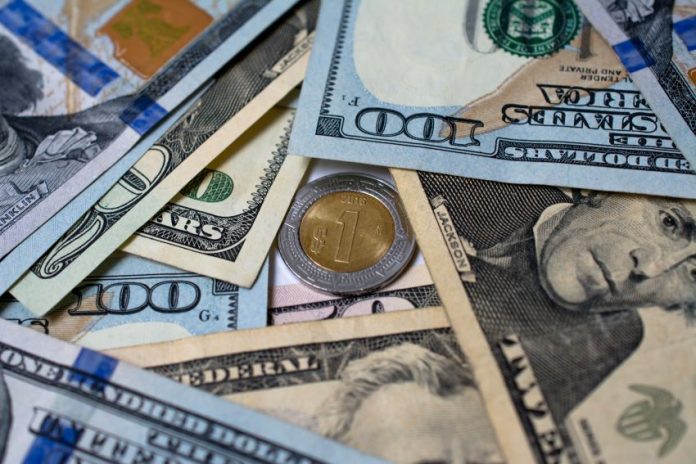Tesla CEO Elon Musk’s statement that the company’s planned “gigafactory” project in Mexico is currently “paused” was among the factors that caused Mexico’s peso to depreciate against the U.S. dollar on Wednesday morning, according to Mexican economic analyst Gabriela Siller.
Compared to its closing position on Tuesday, the peso depreciated around 1.5% to reach 18.42 to the greenback on Wednesday morning, according to Bloomberg data.
La depreciación del peso hoy se debe a 1) reforma al Poder Judicial, 2) decisión de Tesla de aplazar hasta después de las elecciones de EEUU la decisión de venir a México y 3) la publicación de la inflación en México que se aceleró nuevamente.
— Gabriela Siller Pagaza (@GabySillerP) July 24, 2024
Banco Base analyst Gaby Siller’s X post in which she cited Elon Musk’s announced decision to pause Tesla’s gigafactory construction in the state of Nuevo León as a factor in the peso’s drop in value.
The currency subsequently recovered slightly to trade at 18.37 to the dollar shortly after 5 p.m. Mexico City time.
Siller, director of economic analysis at Mexican bank Banco Base, attributed the depreciation of the peso to three factors:
- Concern about the government’s proposed judicial reform.
- Tesla’s announcement that it will “postpone” a decision about the planned Nuevo León gigafactory until after the Nov. 5 presidential election in the United States.
- The publication of data on Wednesday that showed that inflation in Mexico continued to increase in the first half of July.
The judicial reform
Siller said that the proposed judicial reform — which could be approved by Congress as soon as September — “generates fear because it could damage legal certainty” in Mexico.
Such a scenario, she added, “would considerably affect investment growth in Mexico.”
The reform, if approved, would allow Mexicans to directly elect Supreme Court justices and other judges from candidates that would be nominated by the sitting president. Critics argue that the reform would weaken rather than strengthen the judiciary.
After Morena candidate Claudia Sheinbaum and the ruling Morena party won comprehensive victories in the June 2 presidential and congressional elections, the peso depreciated sharply on concerns that the new Congress could approve the proposed judicial reform and other controversial constitutional reform proposals put forward by President Andrés Manuel López Obrador, including one that aims to disband a range of autonomous government agencies.

What did Musk say about the Mexico Tesla gigafactory?
During Tesla’s Q2 earnings call on Tuesday, Musk was asked for an “updated timeline” for its proposed US $10 billion Nuevo León gigafactory, which the company first announced in March 2023 but hasn’t started building.
“We currently are paused on Giga Mexico. I think we need to see where things stand after the [U.S. presidential] election. Trump has said he’ll put heavy tariffs on vehicles produced in Mexico,” he said.
“So it doesn’t make sense to invest a lot in Mexico if that is going to be the case. So we kind of need to see the way things play out politically,” the Tesla CEO added.
In an X post on Tuesday, Siller said that if Trump wins the U.S. election on Nov. 5, “it’s possible that Tesla will never arrive in Mexico.”
Trump has threatened to impose tariffs on vehicles made in Mexico by Chinese companies, but he hasn’t publicly announced any plan that would affect vehicles made here by Tesla, a U.S. company based in Austin, Texas.
Various observers questioned the cogency of Musk’s remarks.
A tale of two interest rates and Mexico’s peso
Mexican national statistics agency INEGI reported Wednesday that Mexico’s annual headline inflation rate increased to 5.61% in the first half of July. In better news, the annual core inflation rate, which excludes volatile food and energy prices, fell to 4.02%, continuing a downward trend that began in early 2023.
Some analysts believe that the Bank of Mexico will cut its key interest rate on Aug. 8 due to core inflation’s continuing decline. Such a move could affect the peso adversely as it would reduce the differential between the Bank of Mexico’s key interest rate (currently 11%) and that of the United States Federal Reserve (5.25%–5.5%), provided the Fed doesn’t cut its federal funds rate next week.
The peso has benefited for an extended period from the significant difference between the two interest rates.
The peso appreciated to an almost nine-year high of 16.30 to the dollar in April, but it depreciated to 18.99 to the greenback not long after the elections.
At 18.37 to the greenback, the peso is 7.4% weaker than it was just before Mexicans went to the polls on June 2.
With reports from El Financiero and Debate
